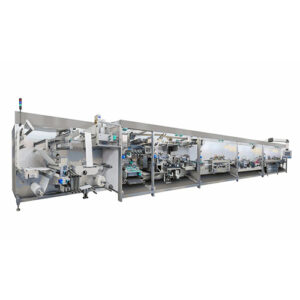A sanitary napkin production line can empower women through employment and entrepreneurship opportunities in several ways:
- Job Creation: Establishing a sanitary napkin production line creates employment opportunities, particularly for women who may face barriers to entering the workforce. By providing stable and dignified employment, production lines contribute to economic empowerment and financial independence for women, allowing them to support themselves and their families.
- Skills Development: Working in a sanitary napkin production line provides women with valuable skills and training in manufacturing, quality control, machine operation, and other aspects of production. These skills can enhance women’s employability and enable them to pursue career advancement opportunities within the industry or other sectors.
- Entrepreneurship: Some women may seize entrepreneurial opportunities by starting their own sanitary napkin production businesses or becoming distributors of sanitary napkin products. A production line can serve as a catalyst for women to launch their ventures, providing access to production equipment, training, technical support, and market opportunities.
- Leadership Opportunities: Women employed in managerial or supervisory roles within a sanitary napkin production line can serve as role models and mentors for their peers, inspiring other women to pursue leadership positions and career advancement opportunities in traditionally male-dominated industries.
- Community Impact: Women employed in sanitary napkin production lines often reinvest their earnings into their families and communities, contributing to poverty alleviation and socio-economic development. By empowering women economically, sanitary napkin machine manufacturers in china production lines help create ripple effects that benefit entire communities, including improved access to education, healthcare, and social services.
- Women’s Health Advocacy: Women working in sanitary napkin production lines may become advocates for women’s health and menstrual hygiene management initiatives, raising awareness about the importance of menstrual hygiene and promoting access to affordable and high-quality sanitary napkin products in their communities.
- Social Empowerment: Employment in a sanitary napkin production line can empower women socially by providing opportunities for networking, collaboration, and collective action. Women may form support networks, cooperatives, or community groups to address common challenges, advocate for their rights, and promote gender equality and women’s empowerment initiatives.
- Gender Equality: By promoting women’s participation in the workforce and providing equal opportunities for employment and advancement, sanitary napkin production lines contribute to gender equality and women’s empowerment agendas. By breaking down gender stereotypes and barriers, production lines help create more inclusive and equitable societies.
Overall, a sanitary napkin production line can serve as a powerful vehicle for empowering women through employment and entrepreneurship opportunities, fostering economic independence, skills development, leadership advancement, community impact, and social empowerment. By investing in women’s empowerment, production lines not only contribute to individual prosperity but also drive broader socio-economic development and gender equality agendas.


Leave a Reply